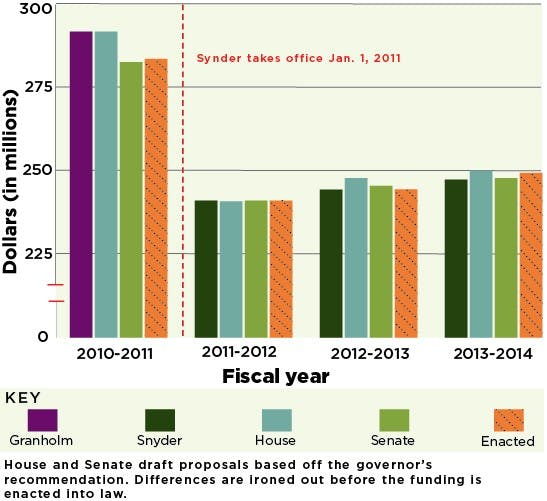LANSING — A recommendation for funding Michigan’s public universities that would restore MSU to about half of the funding cut during Snyder’s first year in office was reviewed by the House Higher Education Subcommittee Wednesday.
Gov. Rick Snyder’s recommendation calls for a 6.1 percent increase from the previous year, which equates to a little over $15 million.
Snyder recommended returning $76.9 million to universities in the upcoming fiscal year.
Robbie Jameson, the State Budget Office’s director of office of education and infrastructure, said half of the funds will be allocated to universities based on the levels before Snyder took office.
The other half would be appropriated through a system government officials refer to as performance funding.
It quantifies university performance through a number of factors such as six-year graduation rates, the number of degrees completed and the amount spent on research and development.
This year, Snyder’s proposal included the number of Pell Grant students as a marker of performance funding. MSU had almost 10,000 Pell Grant recipients two academic years ago.
Kyle Jen, fiscal analyst for the higher education budget, said different ways of measuring performance lead to discrepancies in proposals from the governor, House and Senate.
“This’ll be the third year the discussion revolves around performance funding,” Jen said. “The differences between the House and the Senate and the governor’s proposal are really just a function of which performance meters they choose and how they implement them.”
Snyder also proposed the establishment of a $100 million competitive bond aimed at increasing and retaining engineering graduates in Michigan.
According to the proposal, the fund would be used for “capital improvements related to the construction, expansion, renovation, repurposing and equipping of facilities.”
Institutions such as MSU would have to submit requests for proposal and would compete with each other for the funds.
The College of Engineering spent about a year working with the governor alongside other engineering schools on the proposal, the college’s acting dean and engineering professor Leo Kempel said.
He said Michigan businesses have a shortage of engineers.
“The economy is evolving and growing in way different than in the past, and the companies in Michigan have found they need more trained engineers,” Kempel said.
Kempel said he was confident MSU would be awarded bond funds and was excited about the prospect of the bond because the college is “already looking to expand our programs.”
“It’s an alignment of the interests of the state and the planning that we’ve been going through in the College of Engineering and Michigan State as a whole,” Kempel said.
The projects universities propose would have have to demonstrate they increase engineering graduates and provide a plan for ensuring the engineers stay in Michigan after college.
A proposal also would have to partner with at least one Michigan employer that will provide a “tangible commitment” to hire engineering graduates, according to a State Budget Office document.
Kempel said it’s not clear what’s meant by a tangible commitment, but said MSU could demonstrate their engineers make an impact on state businesses.
Support student media!
Please consider donating to The State News and help fund the future of journalism.
Discussion
Share and discuss “House subcommittee reviews proposed higher education funding” on social media.







